(完整版)中考英语情态动词考点归纳与例析
初中情态动词知识点归纳
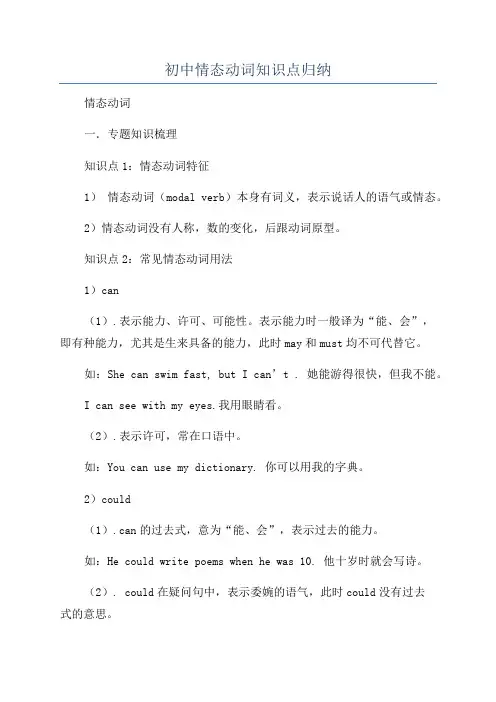
初中情态动词知识点归纳情态动词一.专题知识梳理知识点1:情态动词特征1)情态动词(modal verb)本身有词义,表示说话人的语气或情态。
2)情态动词没有人称,数的变化,后跟动词原型。
知识点2:常见情态动词用法1)can(1).表示能力、许可、可能性。
表示能力时一般译为“能、会”,即有种能力,尤其是生来具备的能力,此时may和must均不可代替它。
如:She can swim fast, but I can’t . 她能游得很快,但我不能。
I can see with my eyes.我用眼睛看。
(2).表示许可,常在口语中。
如:You can use my dictionary. 你可以用我的字典。
2)could(1).can的过去式,意为“能、会”,表示过去的能力。
如:He could write poems when he was 10. 他十岁时就会写诗。
(2). could在疑问句中,表示委婉的语气,此时could没有过去式的意思。
如:Could you do me a favor?你能帮我个忙吗?—Could I use your pen? 我能用一下你的钢笔吗?—Yes, you can.可以。
(注意回答)3)must(1).must表示主观看法,意为“必须、一定”。
Must I hand in my homework right now? 我必须现在交作业吗?(2)其否定形式mustn’t表示“一定不要” “千万别” “禁止,不许”如:You mustn’t play with fire. 你不许玩火。
You mustn’t be late.你一定不要迟到。
(3)对must引导的疑问句,肯定回答为must,否定回答为needn’t 或don’t have to .如:—Must I finish my homework?我现在必须完成作业吗?—No, you needn’t.不,你不必。
情态动词用法归纳(全)(1)
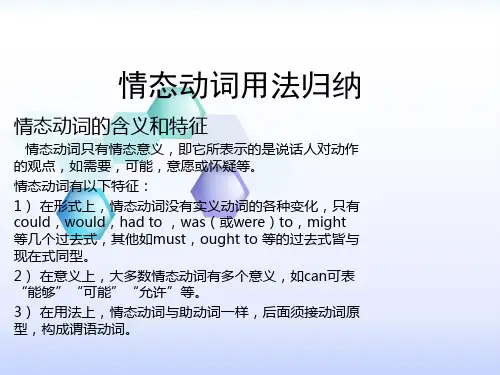
2) need 作情态动词用时, 常用于疑问句、否定句。在肯定句 中一般用must, have to, ought to, should代替。
1.You needn’t come so early. 2. ---- Need I finish the work today?
---- Yes, you must. / No, you needn’t.
may(might)有以下几种形式:
时态 现在式 过去式
肯定式 may might
否定式 缩略否定式
may not
mayn't
might not mightn't
may(might)的基本用法:
1)表可能,暗含不确定,等于possibly,perhaps,maybe,如: He may be busy getting ready for his trip. 他也许在忙于准备外出旅游。
You might ask before you borrow my car. 你可以先问问我再借我的车子嘛。
you might have helped me. 你完全可以帮我一把的呀。
4)May 与might的比较:
might 可表虚拟语气,may则不可以,如: It might help a little if you would only keep clean .
He should do some work,but he doesn't want to 他应该做些工作,但是他不想做。
4)表推测,暗含很大的可能,如:
The film should be very good as it is starring first-class actors. 这部电影是一流的演员主演的,可能拍得很好。
【英语】中考考点_情态动词知识点汇总(全)经典
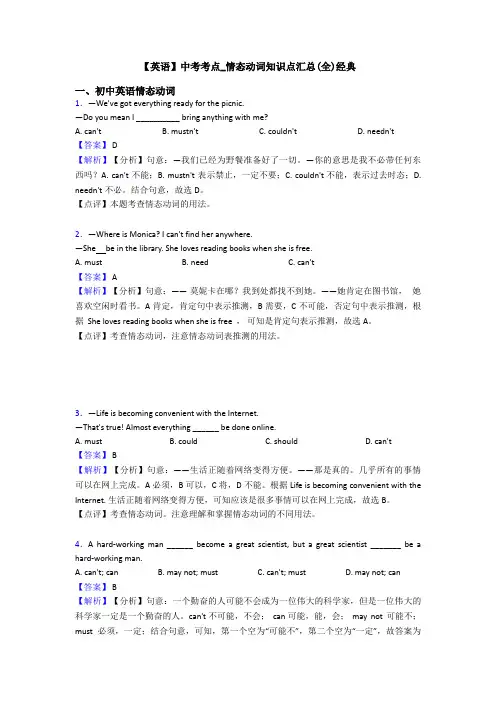
【英语】中考考点_情态动词知识点汇总(全)经典一、初中英语情态动词1.—We've got everything ready for the picnic.—Do you mean I __________ bring anything with me?A. can'tB. mustn'tC. couldn'tD. needn't【答案】 D【解析】【分析】句意:—我们已经为野餐准备好了一切。
—你的意思是我不必带任何东西吗?A. can't 不能;B. mustn't 表示禁止,一定不要;C. couldn't不能,表示过去时态;D. needn't不必。
结合句意,故选D。
【点评】本题考查情态动词的用法。
2.—Where is Monica? I can't find her anywhere.—She be in the library. She loves reading books when she is free.A. mustB. needC. can't【答案】 A【解析】【分析】句意:——莫妮卡在哪?我到处都找不到她。
——她肯定在图书馆,她喜欢空闲时看书。
A肯定,肯定句中表示推测,B需要,C不可能,否定句中表示推测,根据 She loves reading books when she is free ,可知是肯定句表示推测,故选A。
【点评】考查情态动词,注意情态动词表推测的用法。
3.—Life is becoming convenient with the Internet.—That's true! Almost everything ______ be done online.A. mustB. couldC. shouldD. can't【答案】 B【解析】【分析】句意:——生活正随着网络变得方便。
中考英语情态动词考点总结与归纳
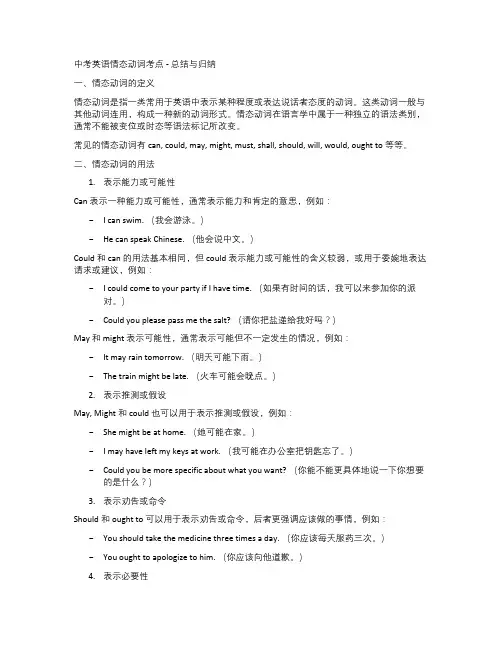
中考英语情态动词考点 - 总结与归纳一、情态动词的定义情态动词是指一类常用于英语中表示某种程度或表达说话者态度的动词。
这类动词一般与其他动词连用,构成一种新的动词形式。
情态动词在语言学中属于一种独立的语法类别,通常不能被变位或时态等语法标记所改变。
常见的情态动词有 can, could, may, might, must, shall, should, will, would, ought to 等等。
二、情态动词的用法1.表示能力或可能性Can 表示一种能力或可能性,通常表示能力和肯定的意思,例如:-I can swim. (我会游泳。
)-He can speak Chinese. (他会说中文。
)Could 和 can 的用法基本相同,但 could 表示能力或可能性的含义较弱,或用于委婉地表达请求或建议,例如:-I could come to your party if I have time. (如果有时间的话,我可以来参加你的派对。
)-Could you please pass me the salt? (请你把盐递给我好吗?)May 和 might 表示可能性,通常表示可能但不一定发生的情况,例如:-It may rain tomorrow. (明天可能下雨。
)-The train might be late. (火车可能会晚点。
)2.表示推测或假设May, Might 和 could 也可以用于表示推测或假设,例如:-She might be at home. (她可能在家。
)-I may have left my keys at work. (我可能在办公室把钥匙忘了。
)-Could you be more specific about what you want? (你能不能更具体地说一下你想要的是什么?)3.表示劝告或命令Should 和 ought to 可以用于表示劝告或命令,后者更强调应该做的事情,例如:-You should take the medicine three times a day. (你应该每天服药三次。
中考考点_情态动词知识点汇总
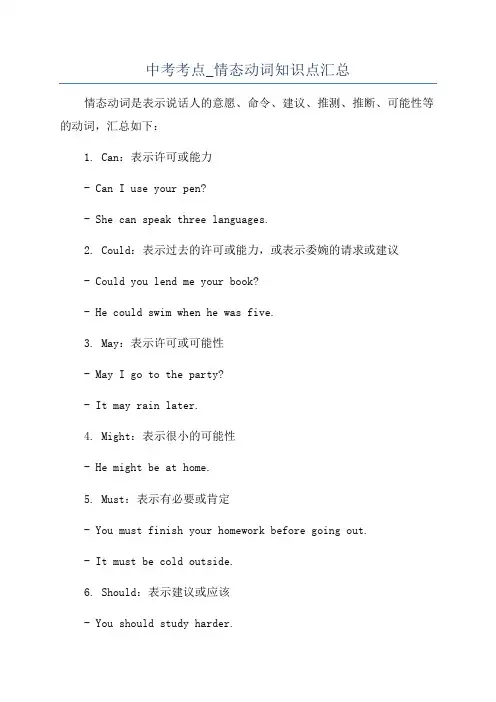
中考考点_情态动词知识点汇总情态动词是表示说话人的意愿、命令、建议、推测、推断、可能性等的动词,汇总如下:1. Can:表示许可或能力- Can I use your pen?- She can speak three languages.2. Could:表示过去的许可或能力,或表示委婉的请求或建议- Could you lend me your book?- He could swim when he was five.3. May:表示许可或可能性- May I go to the party?- It may rain later.4. Might:表示很小的可能性- He might be at home.5. Must:表示有必要或肯定- You must finish your homework before going out.- It must be cold outside.6. Should:表示建议或应该- You should study harder.7. Shall:表示征求意见或提出建议,或用于第一人称的疑问句中- Shall we go to the movies tonight?- What shall I do with this problem?8. Will:表示意愿、意愿、习惯或将来的行动- I will help you with your homework.- She will be here in a few minutes.9. Would:表示过去的意愿或习惯,或表示委婉的请求、邀请或建议- Would you like some tea?- He would always go for a walk after dinner.10. Ought to:表示应该,常用于表达责任或义务- You ought to apologize for what you did.这些是常见的情态动词,掌握它们的用法可以帮助你更准确地表达自己的意图和观点。
中考英语情态动词考点归纳与例析
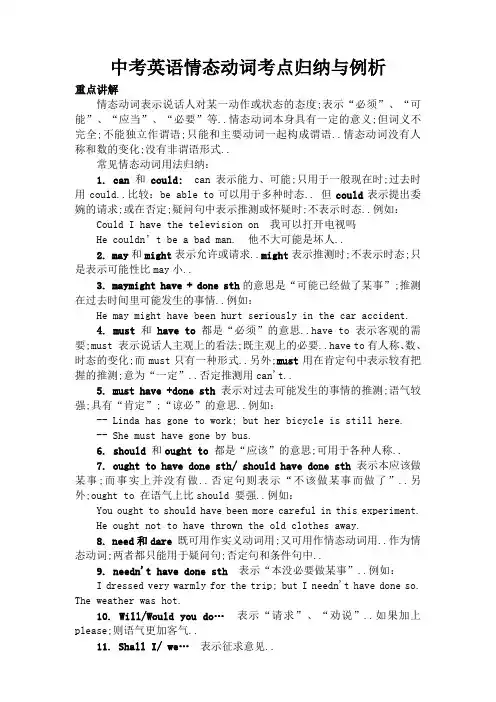
中考英语情态动词考点归纳与例析重点讲解情态动词表示说话人对某一动作或状态的态度;表示“必须”、“可能”、“应当”、“必要”等..情态动词本身具有一定的意义;但词义不完全;不能独立作谓语;只能和主要动词一起构成谓语..情态动词没有人称和数的变化;没有非谓语形式..常见情态动词用法归纳:1.can和could: can表示能力、可能;只用于一般现在时;过去时用could..比较:be able to可以用于多种时态.. 但could表示提出委婉的请求;或在否定;疑问句中表示推测或怀疑时;不表示时态..例如:Could I have the television on 我可以打开电视吗He couldn’t be a bad man. 他不大可能是坏人..2. may和might表示允许或请求..might表示推测时;不表示时态;只是表示可能性比may小..3. maymight have + done sth的意思是“可能已经做了某事”;推测在过去时间里可能发生的事情..例如:He may might have been hurt seriously in the car accident.4. must和have to都是“必须”的意思..have to 表示客观的需要;must 表示说话人主观上的看法;既主观上的必要..have to有人称、数、时态的变化;而must只有一种形式..另外;must用在肯定句中表示较有把握的推测;意为“一定”..否定推测用can't..5. must have +done sth 表示对过去可能发生的事情的推测;语气较强;具有“肯定”;“谅必”的意思..例如:-- Linda has gone to work; but her bicycle is still here.-- She must have gone by bus.6. should和ought to 都是“应该”的意思;可用于各种人称..7. ought to have done sth/ should have done sth 表示本应该做某事;而事实上并没有做..否定句则表示“不该做某事而做了”..另外;ought to 在语气上比should 要强..例如:You ought to should have been more careful in this experiment.He ought not to have thrown the old clothes away.8. need和dare 既可用作实义动词用;又可用作情态动词用..作为情态动词;两者都只能用于疑问句;否定句和条件句中..9. needn't have done sth 表示“本没必要做某事”..例如:I dressed very warmly for the trip; but I needn't have done so. The weather was hot.10. Will/Would you do… 表示“请求”、“劝说”..如果加上please;则语气更加客气..11. Shall I/ we… 表示征求意见..12. would like to do sth 表示“想要做某事= want to do sth”;为固定搭配..例如:Would you like to go with me中考链接1. -- Can I go fishing with you; Dad-- No; you ________. You ________ stay at home and do your homework first.A. won’t; mayB. can’t; mustC. shouldn’t; oughtD. needn’t; should答案:B..解析问句是说“可以去钓鱼吗”从答句结尾可知;父亲是叫孩子呆在家里做作业;所以否定回答应为No; you can’t..2. -- Our class won the English speaking contest.-- Congratulations You________ be very proud of it.A. canB. needC. wouldD. must答案:D..解析根据上下文;本题要填表示肯定推测的must..答句的意思是“祝贺你们你们一定为此而自豪..”3.-- Have you seen my glassesI ________ find them.-- Sorry; I haven’t seen them.A. can’tB. shouldn’tC. won’tD. mustn’t答案:A..解析提问的人是在找不到自己的眼镜的情况下问“Have you seen my glasses ”的;所以选A..4. -- Must I write all the words down now-- No; you ________.A. mustn`tB. can’tC. won’tD. needn’t答案:D..解析用must提问时;否定回答表示“不必要”时;用needn’t..5. -- The sports shoes must be Linda’s.-- No; they _____ be. They’re too small for her.A. mustn’tB. can’tC. may notD. might not答案:B..解析从答句开头可知;这里是有把握的否定判断;要用can’t..句意为“不可能是”..6. -- You ________sleep in class.-- Sorry; Miss Wang. I _______.A.mustn’t; mustn’tB. can’t ; needn’tB.C. mustn’t; won’t D. shouldn’t ; may not答案:C..解析mustn’t 表示禁止;意思是“千万不要”..第二空填won’t; 表示“我不会再睡觉的” ..7. -- May I take the magazine out of the reading room-- _______. Please read it here.A. Certainly.B. No; you need n’tC. No; you can’t.D. No; you may not.答案:C..解析阅览室的杂志一般只能在阅览室里看;是不可以拿走的..”can’t”表示“不可以”;语气较强;所以选C..8. -- Excuse me ; how can I get to the hi-tech Exhibition Hall-- Sorry; I am new here. The policeman over there ______know.A. shallB. mayC. needD. would答案:B..解析may表示猜测;意思为“可能”..问句的意思是“怎样去高交会馆”..回答是“那边的警察可能知道..”9. You ________ return the book now. You can keep it for another week.A. needn’tB. mustn’tC. can’tD. won’t答案:A..解析从结尾一句的意思判断选A ..needn’t的意思是“不必”..10. -- Tom; where is your father-- I’m not sure. He _______ in his office.A. isB. may beC. maybeD. may答案:B..解析从“I’m not sure”判断;回答问题的人不能确定他父亲在那里;所以排除A..而C和D在句中都不能单独作谓语;故选B..11. He went back home just now. He ___be here now.A. mightn’tB. needn’tC. can’tD. has to答案:C..解析can’t表示表示猜测;意思是“不可能”..习题精炼1. -- Could I borrow your dictionary--Yes; of course; you______.A. mightB. willC. canD. should2. -- Shall I tell John about it-- No; you _______. I've told him already.A. needn'tB. wouldn'tC. mustn'tD.shouldn't3. Tom ought not to ___ me your secret; but he meant no harm.A. tellB. have toldC. be tellingD.having told4. -- May I smoke here-- No; you _______.A. mustn'tB. don'tC. needn'tD.must5. You _______ to school tomorrow if you go to look after your motherin the hospital.A. don't need comeB. don't comeC. needn't to comeD. needn't come6. -- Is the girl in red Mary-- No; it _______ be Mary . She's doing her homework at home.A. mustB. mayC. can'tD. mustn't7. -- Why isn’t Tom in school today-- He _____ be sick; or he’d have been here already.A. shouldB. mustC. mayD. would8. -- Is Mr Hu in the reading room--No; he _____be there. He has gone to Tianjing.A. mustn’tB. needn’tC. won’tD. can’t9. -- May mustn’t I go swimming in the river; Mum-- No; you ______. It’s dangerous.A. mustn’tB. needn’tC. don’tD. haven’t10. -- ______you like to go shopping with me-- Yes; I ________.A. Would; wouldB. Will; will likeC. Would; would loveD. Would ; would love to11. -- Must I hand in the homework now-- No ; you ______. But you _____hand it in tomorrow.A. mustn’t; mustB. needn’t; have toC. needn’t;canD. musn’t; must答案详解1. 答案:C..解析问句开头的could表示委婉的语气;并不表示时态..答语中of course表示肯定的语气;允许某人做某事时;用can和 may来表达;不能用could或might..2. 答案:A..解析needn't 意为“不必”;“不用”.. wouldn't意为“将不”;“不会的”.. mustn't意为“禁止”;“不可以”.. shouldn't意为“不应该”..从结尾的一句的意思判断;这里要用needn't..3. 答案:B..解析由于后半句为过去时;可见“告诉秘密”的动作发生在其前;因此ought not to 后要用完成时“have told”..4. 答案:A..解析问句的意思是“我可以在这儿抽烟吗”;否定回答为“你不可以”;因此选A..mustn't含有禁止意味;语气比 may not强..5. 答案:D..解析从语法结构上看;A项中 come前缺 to.. C 项中come前的 to应去掉..6. 答案:C..解析根据最后一句“玛丽正在家里做家庭作业”这一信息;可知“穿红衣服的姑娘不是玛丽”;应用can't;表否定的推测..故选C..7. 答案:B..解析must和may都有表示猜测的用法..Must表示的可能性较大;而 may表示可能性较小..从答句中我们可以判断这里的可能性应该较大;因为“他肯定生病了;否则;他早就到这儿了”..所以该题的答案为B...8. 答案:D..解析根据最后一句判断;Mr Hu已经去天津了;他不可能在这里..表示否定的推测要用can’t..mustn’t 表示“不可以”;不允许;needn’t表示“不必”; won’t表示“不会”猜测的意思.. 所以选D..9. 答案:A..解析mustn’t表示禁止意味;意思是“不可以”..10. 答案:D..解析Would you like to ….. 的肯定回答要用 I would love to或 I would like to..would可以省略为“d ”;但结尾的 to不能省略..11. 答案: B..解析第一空只能用needn’t;第二空可以用must或have to..。
完整word版初中英语语法专题 情态动词
初中英语语法专题情态动词一、【情态动词】又叫情态助动词。
它们具有以下特点:⑴它们必须与其他动词连用,即:情态动词+动词原形表示说话人对所述动作的看法,如需要、可能、意愿或怀疑等。
⑵绝大多数情态动词没有人称和数的变化,即第三人称单数不加-s(以be和have 开头的情态动词短语除外)。
⑶在意义上,情态动词具有“多义性”。
例:can既可表示能力,又可表示可能、允许等意义。
有can (could), may (might), must, have to, shall (should, will (would), dare (dared), need (needed), ought to等。
情态动词无人称和数的变化;不能单独使用,必须与其后的动词原形构成谓语。
^^can 表示能力,意为“能会”表示推测,意为“可能”,常用于否定句和疑问句中表示请求,允许,意为“可以”.^^could 是can 的过去式,意为“能、会”,表示过去的能力在疑问句中表示委婉请求 .^^may 表示请求、许可,意为“可以”表示推测,常用于肯定句中,意为“可能、也许”. ^^might 是may的过去式,表推测,常用于肯定句中,意为“可能、也许” .^^must 表示主观看法,意为“必须、应该”表有把握的推测,用语肯定句 .^^need \表示需要、必须,主要用于否定句和疑问句中 .^^dare 表示敢于,主要用于否定句和疑问句中.^^should 意为“应该”,表示要求和命令表示劝告、建议.^^had better 意为“最好”,表示建议.^^used to意为“过去常常,表示过去的动作、行为.部分情态动词的基本用法:考点一情态动词知识清单1. can的基本用法:⑴表示体力或智力上的能力,即“能够,会”,可与be able to转换。
例:He can speak English. = He is able to speak English.—Can you play basketball?— No, I can't.如果表示将来具备的能力,要用will be able to。
情态动词用法归纳全
I’ll not be able to come this afternoon. 当表示“经过努力才得以做成功某事”时应用be able to
,不能用Can。如:
He was able to go to the party yesterday evening in spite of the heavy rain.
flowers. 2) need 作情态动词用时, 常用于疑问句、否定句。在肯定句中一般用
must, have to, ought to, should代替。 1. You needn’t come so early.
2. ---- Need I finish the work today? ---- Yes, you must. / No, you needn’t.
表示劝告、建议
had better 意为 “最好”, 表示建议
used to 意为 “过去常常, 表示过去 的动作、行为
考点一 can , may, must 等情态动词在陈述句中的用法
1. can 的用法
(3)表示许可,常在口语中。如:
(1)表示能力、许可、可能性。 表示 能力时一般译为“能、会”, 即有种 能力,尤其是生来具备的能力,此 时may 和must 均不可代替它。如:
You must stay here until I come back.在我回来之前你必须呆在这儿。
Must I hand in my homework right now? 我必须现在交作业吗?
六、 will, would
• 3) would表示过去反复发生的动作或某种倾向。would表示过去习惯时 比used to正式, 且没有“现已无此习惯”的含义。
情态动词的用法总结及例句解析
情态动词的用法总结及例句解析情态动词是英语中常用的一类动词,用来表示说话人的态度、情绪、推测、能力等。
它在句子中通常与动词原形搭配使用,起到强调、修饰或者推测的作用。
本文将对情态动词的用法进行总结,并通过例句解析来帮助读者更好地理解。
一、情态动词的基本用法情态动词通常没有人称和数的变化,也没有时态的变化,后面接动词原形。
有以下几种情态动词:can,could,may,might,shall,should,will,would,must,ought to等。
1. 表示能力或可能性- I can swim.(我会游泳。
)- He may come to the party.(他可能会来参加派对。
)2. 表示允许或禁止- You may go now.(你现在可以走了。
)- You must not smoke here.(你不能在这里抽烟。
)3. 表示建议或命令- You should take a break.(你应该休息一下。
)- You ought to apologize to him.(你应该向他道歉。
)4. 表示推测或猜测- He could be there.(他可能在那里。
)- It might rain tomorrow.(明天可能会下雨。
)5. 表示义务或必须- We must finish the project on time.(我们必须按时完成这个项目。
)- You ought to help him.(你应该帮助他。
)二、情态动词的细分用法除了以上的基本用法外,情态动词还有一些特殊的用法,需要注意其具体含义和用法。
1. can 和 could- 表示能力和技能:I can play the piano.(我会弹钢琴。
)- 表示请求或许可:Can I use your computer?(我可以用你的电脑吗?)- could 还可以用来表示过去的能力或许可:When I was young, I could run very fast.(小时候,我跑得很快。
中考英语复习,必考的语法重点系列之情态动词用法归纳
中考英语复习,必考的语法重点系列之情态动词用法归纳情态动词是每年中考必考的考点之一,看似不难,但是从同学们得分情况看,其中的一些知识点还是很容易出错的。
今天我们就情态动词的用法及考点作详细归纳,只为帮助到更多有需要的同学们。
一、情态动词的基本用法情态动词本身是有意义的,通常表示说话人认为某事“可能、或许、应该”发生等。
它没有人称和数的变化,在句子当中不能单独作谓语,只能跟后面的动词一起构成谓语。
常考点之一:情态动词后接动词原形。
常见的情态动词主要有:以上这些情态动词,可以分成四类,分别是:只作情态动词(must,can/could,may/might,ought to );既是实义动词,又是情态动词(need,dare );既是助动词,又是情态动词(shall/should,will/would);具有情态动词特点词(have/had to,used to)。
情态动词记忆口诀:为了方便记忆和区分这些情态动词的意义和用法,大家可以利用下面的口诀。
情态动词表委婉,动词原形跟后面。
can“能力”may“许可”,must“责任”或“义务”;否答needn’t表“不必”;need“需要”,dare“敢”;should “应该”would“愿”,have to“被迫”因客观。
这里其中包含了考点must和 have to的用法区别以及needn’t用法。
具体用法下面将会讲到。
二、情态动词考点分析1、can和could的用法和考点1)表示能力或客观可能性,还可以表示请求和允许。
如:Can you come here tomorrow?考点注意:1)could表示请求,语气更委婉,主要用于疑问句,不可用于肯定句,答语应用can,也就是说现在时态的回答语不能用could。
如:Could I borrow this book from you?Yes,you can. (否定答语可用No/Sorry,I’m afraid not.)2)can表示能力时,还可用be able to代替。
- 1、下载文档前请自行甄别文档内容的完整性,平台不提供额外的编辑、内容补充、找答案等附加服务。
- 2、"仅部分预览"的文档,不可在线预览部分如存在完整性等问题,可反馈申请退款(可完整预览的文档不适用该条件!)。
- 3、如文档侵犯您的权益,请联系客服反馈,我们会尽快为您处理(人工客服工作时间:9:00-18:30)。
中考英语情态动词考点归纳与例析【重点讲解】情态动词表示说话人对某一动作或状态的态度,表示“必须”、“可能”、“应当”、“必要”等。
情态动词本身具有一定的意义,但词义不完全,不能独立作谓语,只能和主要动词一起构成谓语。
情态动词没有人称和数的变化,没有非谓语形式。
常见情态动词用法归纳:1.can和could: can表示能力、可能,只用于一般现在时,过去时用could。
(比较:be able to可以用于多种时态。
) 但could表示提出委婉的请求,或在否定,疑问句中表示推测或怀疑时,不表示时态。
例如:Could I have the television on? 我可以打开电视吗?He couldn’t be a bad man.他不大可能是坏人。
2. may和might表示允许或请求。
might表示推测时,不表示时态,只是表示可能性比may小。
3. may(might) have + done sth的意思是“可能已经做了某事”,推测在过去时间里可能发生的事情。
例如:He may (might) have been hurt seriously in the car accident.4. must和have to都是“必须”的意思。
have to 表示客观的需要,must 表示说话人主观上的看法,既主观上的必要。
have to有人称、数、时态的变化,而must只有一种形式。
另外,must用在肯定句中表示较有把握的推测,意为“一定”。
否定推测用can't。
5. must have +done sth 表示对过去可能发生的事情的推测,语气较强,具有“肯定”,“谅必”的意思。
例如:-- Linda has gone to work, but her bicycle is still here.-- She must have gone by bus.6. should和ought to 都是“应该”的意思,可用于各种人称。
7. ought to have done sth/ should have done sth 表示本应该做某事,而事实上并没有做。
否定句则表示“不该做某事而做了”。
另外,ought to 在语气上比should 要强。
例如:You ought to (should) have been more careful in this experiment.He ought not to have thrown the old clothes away.8. need和dare 既可用作实义动词用,又可用作情态动词用。
作为情态动词,两者都只能用于疑问句,否定句和条件句中。
9. needn't have done sth 表示“本没必要做某事”。
例如:I dressed very warmly for the trip, but I needn't have done so. The weather was hot.10. Will/Would yo u do…? 表示“请求”、“劝说”。
如果加上please,则语气更加客气。
11. Shall I/ we…?表示征求意见。
12. would like to do sth 表示“想要做某事(= want to do sth)”,为固定搭配。
例如:Would you like to go with me?【中考链接】1. -- Can I go fishing with you, Dad?-- No, you ________. You ________ stay at home and do your homework first.A. won’t, mayB. can’t, mustC. shouldn’t, oughtD. needn’t, should答案:B。
【解析】问句是说“可以去钓鱼吗?”从答句结尾可知,父亲是叫孩子呆在家里做作业,所以否定回答应为No, you can’t。
2. -- Our class won the English speaking contest.-- Congratulations! You________ be very proud of it.A. canB. needC. wouldD. must答案:D。
【解析】根据上下文,本题要填表示肯定推测的must。
答句的意思是“祝贺你们!你们一定为此而自豪。
”3.-- Have you seen my glasses?I ________ find them.-- Sorry, I haven’t seen them.A. can’tB. shouldn’tC. won’tD. mustn’t答案:A。
【解析】提问的人是在找不到自己的眼镜的情况下问“Have you seen my glasses?”的,所以选A。
4. -- Must I write all the words down now?-- No, you ________.A. mustn`tB. can’tC. won’tD. needn’t答案:D。
【解析】用must提问时,否定回答表示“不必要”时,用needn’t。
5. -- The sports shoes must be Linda’s.-- No, they _____ be. They’re too small for her.A. mustn’tB. can’tC. may notD. might not答案:B。
【解析】从答句开头可知,这里是有把握的否定判断,要用can’t。
句意为“不可能是”。
6. -- You ________sleep in class.-- Sorry, Miss Wang. I _______.A.mustn’t, mustn’tB. can’t , needn’tB. C. mustn’t, won’t D. shouldn’t , may not答案:C。
【解析】mustn’t 表示禁止,意思是“千万不要”。
第二空填won’t,表示“我不会再睡觉的” 。
7. -- May I take the magazine out of the reading room?-- _______. Please read it here.A. Certainly.B. No, you need n’tC. No, you can’t.D. N o, you may not.答案:C。
【解析】阅览室的杂志一般只能在阅览室里看,是不可以拿走的。
”can’t”表示“不可以”,语气较强,所以选C。
8. -- Excuse me , how can I get to the hi-tech Exhibition Hall?-- Sorry, I am new here. The policeman over there ______know.A. shallB. mayC. needD. would答案:B。
【解析】may表示猜测,意思为“可能”。
问句的意思是“怎样去高交会馆?”。
回答是“那边的警察可能知道。
”9. You ________ return the book now. You can keep it for another week.A. needn’tB. mustn’tC. can’tD. won’t答案:A。
【解析】从结尾一句的意思判断选A 。
needn’t的意思是“不必”。
10. -- Tom, where is your father?-- I’m not s ure. He _______ in his office.A. isB. may beC. maybeD. may答案:B。
【解析】从“I’m not sure”判断,回答问题的人不能确定他父亲在那里,所以排除A。
而C和D在句中都不能单独作谓语,故选B。
11. He went back home just now. He ___be here now.A. mightn’tB. needn’tC. can’tD. has to答案:C。
【解析】can’t表示表示猜测,意思是“不可能”。
【习题精炼】1. -- Could I borrow your dictionary?--Yes, of course, you______.A. mightB. willC. canD. should2. -- Shall I tell John about it?-- No, you _______. I've told him already.A. needn'tB. wouldn'tC. mustn'tD. shouldn't3. Tom ought not to ___ me your secret, but he meant no harm.A. tellB. have toldC. be tellingD. having told4. -- May I smoke here?-- No, you _______.A. mustn'tB. don'tC. needn'tD. must5. You _______ to school tomorrow if you go to look after your mother in the hospital.A. don't need comeB. don't comeC. needn't to comeD. needn't come6. -- Is the girl in red Mary?-- No, it _______ be Mary . She's doing her homework at home.A. mustB. mayC. can'tD. mustn't7. -- Why isn’t Tom in school today?-- He _____ be sick, or he’d have been here already.A. shouldB. mustC. mayD. would8. -- Is Mr Hu in the reading room?--No, he _____be there. He has gone to Tianjing.A. mustn’tB. needn’tC. won’tD. can’t9. -- May mustn’t I go swimming in the river, Mum?-- No, you ______. It’s dangerous.A. mustn’tB. needn’tC. don’tD. haven’t10. -- ______you like to go shopping with me?-- Yes, I ________.A. Would, wouldB. Will, will likeC. Would, would loveD. Would , would love to11. -- Must I hand in the homework now?-- No , you ______. But you _____hand it in tomorrow.A. mustn’t, mustB. needn’t, have toC. needn’t,canD. musn’t, must【答案详解】1. 答案:C。
